- Home
- Robert J. Mrazek
Unholy Fire Page 2
Unholy Fire Read online
Page 2
“Well, we had better find some,” I said, trying to keep my voice even. “Take ten men upriver and come back with anything that floats. I’ll take another group downriver with me.”
“Goddamn it, sir, the whole brigade has to get across that river tomorrow,” growled Harlan.
“Don’t worry, Sergeant,” I replied in front of the men. “I’m sure the barges will be here in time for the main force.”
Darkness had fallen by the time I returned from the foraging expedition. We had found two small rowboats, neither bigger than a Maine dory. Harlan arrived back ten minutes later. He had enjoyed better luck, finding a large rowboat that could carry ten men. Unfortunately, it had been out of the water for some time, and the seams leaked so badly that constant bailing was required just to keep it afloat.
I went across with the first group to make sure that Harrison’s Island wasn’t occupied by Confederate pickets. We found a small, abandoned farmhouse there, and I ordered the men to secure it as a command post for Colonel Baker. By then the main attack force was starting to come across from the Maryland side. As they arrived, each regiment was deployed in one of the pastures that covered most of the island.
The barges had still not come, and it took six more hours for the main body to be rowed over in the three boats. Shortly after midnight, Colonel Baker came across with the last of his troops and immediately went to the farmhouse. There were four tiny rooms inside, and each one was packed with officers straining to listen to the colonel as he made his final dispositions. In the reflected glow of the oil lamps on the kitchen table, his smiling, handsome face exuded total confidence.
“Believe me, gentlemen, we will enjoy a glorious victory tomorrow,” he said in a deep baritone voice. “This brigade is ready to fight.”
A robust man of around fifty, Colonel Baker was tall and well formed, with a prominent nose and a firm, clean-shaven jaw. He had removed his hat, and the ring of silver hair crowning his shiny head gleamed in the lamplight. He slowly pivoted in a full circle to face all the officers who were peering at him through the doors of the three other rooms. A cloud of moths swarmed above his head.
“Tomorrow we have a chance to square the books on Bull Run and strike an important blow for freedom,” he went on, as if orating on the floor of the Senate. “I expect us to emulate Caesar’s Tenth Legion … to smite them a real lightning blow!”
With those words, his right fist slammed down on the kitchen table. There was a pause, and then another voice rose from the back parlor.
“What about those barges, Colonel?” asked one of the regimental commanders, with sarcasm in his voice. “At dawn, we’ve got to ferry more than two thousand men over there to the cliffs of Dover. We’ll need to move fast if we’re to have any chance of surprising them.”
A look of minor annoyance came over Colonel Baker’s face, as if someone had complained about one of the men’s shoelaces being untied. He waved a hand at the host of moths hovering around his head.
“That’s a very good point,” he replied, with an elegant smile. “But why don’t we just leave that to General McClellan. He has all the resources of the United States at his disposal. I’m sure they are on their way as we speak.”
At three o’clock that morning, my advance group was ready to cross over to Ball’s Bluff. I had ordered Sergeant Colfax to have the three boats carried over to the Virginia side of the island for us to use in the next crossing. Just before we moved out, Colonel Baker came down to the shoreline to see us off.
“I understand they call you Kit,” he said, shaking my hand and patting me on the back as if I was a favored constituent. In the darkness I could only see the outline of his massive head.
“That’s right, sir,” I said.
“So you have the honor of going in first,” he said next, his voice filled with confidence. “I’m told you grew up on an island off the coast of Maine.”
“Yes, sir.”
“Well then, I’m sure you are not intimidated by that little beak over there.”
Actually, Ball’s Bluff was about the same height as the tallest cliff I knew in Maine. I had tried to imagine two thousand soldiers attempting to climb it as part of a full-scale attack. It would have been impossible.
“No, sir. I will do my best.”
“Yes, of course you will,” he said.
My small force set off into the black, starry night. Aside from the boat poles swishing in the water, there was no sound of movement from any of us. Of course, there could have been a thousand rebels waiting for us on the bluff, and we never would have known. I just stared forward into the void until the bow of the boat scraped up on the Virginia shore.
The riverbank was as slippery as axle grease. Mature trees grew right down to the edge of the water. The current was stronger than on the Maryland side, and it was hard for the men to find their footing. As one of the boats swung away from the bank, it struck a man who then fell back into the river with a loud splash. I nervously awaited the shout from a Confederate picket on the bluff, but the only sound I heard came from the branches swaying above us in the wind.
Using a masked lantern, I finally found an opening in the trees that disappeared into the darkness and sent Sergeant Colfax up to reconnoiter. He returned ten minutes later, out of breath and excited.
“The path leads to the top, but it’s no wider than a horse’s ass, Lieutenant. We’ll have to go up single file.”
After sending the boats back for the next load of men, we started toward the top. It soon became obvious that the path curled back and forth like a coiled snake from one end of the bluff to the other as it wound its way upward. With no break for a rest, it took us twenty minutes to get to the summit. There was another short rise at the top of the bluff, and then the ground leveled off into what appeared to be an open field. I immediately put out scouts in every direction and ordered the rest of the advance group to come up.
The scouts reported back that the field ran for more than two hundred yards toward a tree stand that ringed the far end of the field. There was no sign of the enemy. As the rest of my men came across from Harrison’s, I deployed them in a line along the near edge of the field.
As dawn paled the sky, I could make out a wagon lane that led inland through the trees on the left. Straight ahead of us and to the right was the large field. I sent four scouts to again reconnoiter the woods beyond it.
While I waited for them to return, the first elements of Colonel Baker’s main attack force began coming over the summit of the bluff shortly after daylight. They were from the Fifteenth Massachusetts, and after forming up, they headed off down the wagon lane. Their officers were taking very few precautions about keeping the men quiet any longer. We could hear their nervous chatter a long way down the road. It was no more than ten minutes later that scattered musket fire broke out from the direction they had taken.
“I’d say someone knows we’re here,” growled Sergeant Colfax, spitting out a dark glob of tobacco juice.
I sent word back to the command post on Harrison’s that the Fifteenth had made contact with the enemy. Then we sat down to wait for the rest of the main body to come over. I watched as two wounded men from the Fifteenth were carried back on litters to the crest of the bluff. By then there was no way for them to get back down the path because it was choked with men working their way to the top.
I continued to scan the tree line in front of us with binoculars until the scouts came back. Johnny Harpswell was the first one to report in. He said that Confederate troops were moving into the big patch of woods opposite our position, although he didn’t know whether they were militia or regular combat units.
Johnny had been in my class at Harvard, and like me he had enlisted right after Fort Sumter. The captain of the heavyweight crew team, he was six and a half feet tall, with slablike shoulders and incredible strength. However, his boyishly handsome face was covered with freckles, which made him look about sixteen. Although he had been offered a commission after
he volunteered, he turned it down, saying he preferred the simpler life of a private soldier.
“Well, Kit, I think this is going to be interesting,” Johnny said, as if the two of us were about to visit the Acropolis on a college jaunt to Europe.
By eleven o’clock in the morning, the rest of the Fifteenth Massachusetts had finally made it to the top of the bluff. They formed up and moved inland to join their advance detachment farther up the wagon lane. Shortly after that, Sergeant Colfax pointed out to me that the flow of men coming up from the river had completely stopped. We went back to the crest of the bluff to see what was happening.
The reason for the breakdown was apparent as soon as I looked down the slope. About halfway down the circuitous path, a large bronze cannon was lodged on the narrow trail like a cork in a bottle. Several ropes were tied to the gun carriage, and a group of soldiers was straining at the lines to manhandle the cannon up the narrow track. Ahead of the soldiers manning the ropes, four men with axes were laboriously chopping down trees to widen the trail. They were cursing a blue streak and loudly demanding to be relieved.
Another officer joined us at the crest, and I recognized him as a member of Colonel Baker’s staff. He was a former congressman from Philadelphia.
“The colonel’s favorite cannon,” he said, smiling broadly. “It was a gift from the people of Oregon, and he is very fond of it. It’s his good luck charm.”
Behind the cannon, hundreds of soldiers stood bottlenecked along the entire length of the winding path. Dozens more were standing with their muskets resting on their shoulders in the shallow water down at the riverbank, prevented from even starting up the path. I looked through the tops of the trees toward Harrison’s Island. At least a thousand more were still waiting to come over, most of them just milling about or sitting on their packs. The only craft being used to ferry the attack force were the same three rowboats my men had found the previous night.
“Don’t look so grim, Lieutenant,” said the staff officer. “It’s going to be a great day for the Union. I can smell victory in the air.”
“Yeah … they’re gonna kill us all,” muttered Sergeant Colfax, as we walked back to our position. Harlan had already survived the disaster at Bull Run back in July.
None of us had eaten anything since we’d had supper the night before. Some of the men still had food in their knapsacks, and they shared it around as far as it lasted. Fortunately, we had all filled our canteens in the river, and there was plenty of drinking water. The sun had started its downward journey when the colonel’s bronze cannon finally came over the crest.
“Three hours to drag up one lousy piece,” said Harlan Colfax. “The goddamn Rebs have probably got a whole battery over in those trees by now.”
Colonel Baker came across from Harrison’s early in the afternoon. Apparently, someone had finally located a barge, because the colonel’s big white horse was led over the crest right behind him. His cannon was already deployed out to the left of us.
He ordered our regiment to form the middle of the line facing the woods across the pasture. Then he ordered the New York Tammany Regiment to move forward in a rank up ahead of ours and to the right. I heard a good deal of grumbling from them as they came through our position. They no longer seemed to be spoiling for a fight.
It was well after three o’clock by the time the last of the men from Harrison’s were finally fed into the ranks, and the sun was dipping down toward the tree line. Off to the left, I heard the confident tattoo of a long drum roll followed by the bark of a crisp order to dress one of the lines.
“Well, General McKittredge, what happens now?” said Johnny Harpswell, with an impish grin.
Down on one knee, I remember looking up toward the heavens and mouthing a silent prayer. “Please, God,” I prayed fervently, “don’t let me die until I have made love to a beautiful woman.”
As if in answer to my prayer, the Confederates chose that moment to open up on us. The entire tree line at the other end of the pasture belched out a tremendous plume of smoke, and a split second later, the balls from their first volley of musket fire came whistling past. One tore through the sleeve of my uniform coat and another ricocheted off the scabbard of my cheap presentation sword.
Almost in concert, the Tammany Regiment, which was in the rank up ahead of us to the right, turned as one and ran back through our positions. Their embarrassed officers followed behind, frantically waving their swords and bellowing for their men to rally. Now we were out in front by ourselves.
Another coordinated volley of fire erupted out of the tree line. Men were being hit all around me. Although the Confederates were still completely invisible to us, our troops began firing blindly into the woods. The reek of powder smoke filled my nose.
“Stand fast, men!” I heard one of the company commanders shout, his powerful voice loud and clear over the din. I remember thinking that it was a poor choice of words, since by then most of the men had wisely dropped to the ground. The ones who had been hit were the fellows who had raised their heads or gotten up to shoot on one knee.
Over on the left, Colonel Baker’s bronze cannon began to return the Confederate fire. His artillerymen were well trained, and the first round they fired exploded to good effect in the distant tree line. The Rebel officers must have targeted them then because, after the next enemy volley, none of the gunners were left standing.
Colonel Baker coolly went forward and encouraged some men from the ranks to take over the job. They were more than willing and rushed to load the cannon, firing it as soon as the shell was in place. Unfortunately, they were not prepared for the recoil, and the gun carriage careened backward straight down the rise, crushing several wounded men who were lying in its path before disappearing into the ravine below.
I began walking along the line, making stupid jokes and encouraging the men. As each second went by, I wondered when I would be hit.
“Lord, don’t take me now,” I remember praying over and over, “not until I’ve at least kissed a woman in passion.”
“They’re firing beautifully,” called out Johnny Harpswell, as if we were watching a hockey game against Princeton.
Major Wheelock was shot twice in immediate succession, both balls ripping through his chest. The second one flipped him over on his back. With each heartbeat, his lifeblood poured forth and soaked the earth beside him.
The man lying directly in front of me raised his head to call encouragement to his younger brother, who was farther down the line. An instant later his warm brains were blasted into my eyes. I wiped them away in order to see. That was when the Confederate infantry began moving out of the trees and into the field opposite our position.
“It’s the whole goddamn Reb army,” yelled someone standing behind me.
As they began to come on, I could hear the swelling roar of the Rebel yell for the first time. It slowly grew to a crescendo of noise that drowned out even the noise of the firing. The war cry reminded me of a huge wave about to break on a rocky shore.
On either side of us, men from the other regiments began to melt away. Glancing back down the rise to the bluff, I saw soldiers who were not wounded running toward the path that led to the river.
Colonel Baker was killed a few minutes later. He was out in front of the men on the left, exhorting them to hold on, when he was hit by a hail of fire that slammed him to the ground like a hammer blow. I learned later that he had been struck by eight balls. After he was carried to the rear, no one else took command.
Although I know it was just an illusion, it seemed then as if the ground caught fire, with acrid, foul-smelling smoke billowing up all around us. To my left and right, men were writhing in their death struggles like huge demented worms.
The Confederate attack had driven the surviving pockets of resistance back closer and closer to the edge of the bluff. We were no more than fifty feet away from it when I felt a wave of uncontrollable anger sweep over me. It was like nothing I had ever experienced before. For th
e first time in my life I wanted to kill someone with my bare hands. Black rage filled my brain, crowding out all conscious thought except the compulsion to destroy the men who were massacring us.
“Let’s be shot advancing instead of being slaughtered here like sheep!” I shouted to the men standing around me. “We’re going forward!”
This may sound strange, but it was without fear and filled with elation that I began to charge back up the slope, waving my sword above my head. Never in my life had I felt anything so intensely. Glancing behind me I saw that more than a score of men had followed my lead, including a fiercely grinning Sergeant Colfax. Close to the top of the rise there was a wall of dense powder smoke. As it broke up, I could see a mass of Confederates advancing toward us. Above them waved a huge battle flag, blood red against the setting sun. The surprise of seeing us charging toward them when the battle was so obviously lost caused them to pull up short.
I waded into the first line, slashing madly with my sword as I went. A man toppled to my left, his eyes going vacant as he fell to his knees. Another figure, nothing more than a blur off to the right, fired at me with his pistol before the razor-sharp edge of my sword caught him on the side of the head and he went down, too.
Unlike most men who are shot in battle, I actually saw the soldier who tried to murder me. Although my revolver was already empty, I was still holding it in my right hand when my eyes were drawn to the sight of what appeared to be a comical stage figure towering over the other men. His white-maned head was crowned by a top hat that must have made him nearly seven feet tall.
With his rutted, cadaverous face, he may have been the oldest man on the battlefield. Seventy would be my best guess, although he stood ramrod straight. Even for a Rebel, his choice of uniform was distinctly odd. It consisted of a double-breasted blue frock coat that had matching rows of large gilt buttons running down the chest. He wore white breeches and had on black riding boots that came all the way up to his thighs. The way the tails of his frock coat were billowing out behind him on that windswept plain, he looked like nothing so much as a gigantic old blue jay.

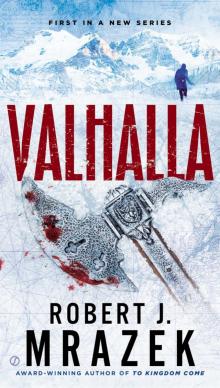 Valhalla
Valhalla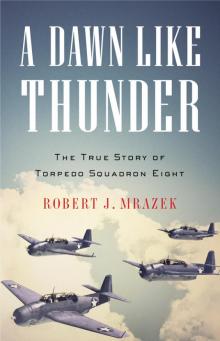 A Dawn Like Thunder
A Dawn Like Thunder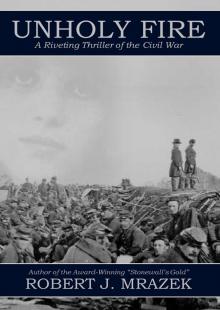 Unholy Fire
Unholy Fire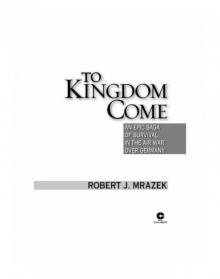 To Kingdom Come
To Kingdom Come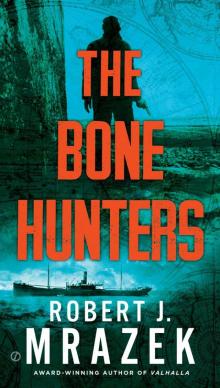 The Bone Hunters
The Bone Hunters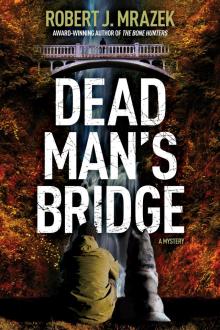 Dead Man's Bridge
Dead Man's Bridge